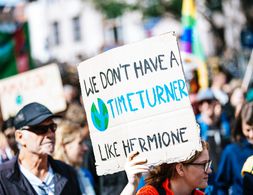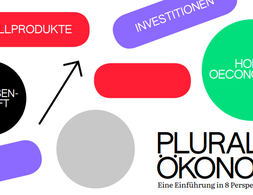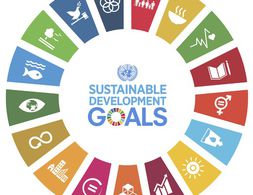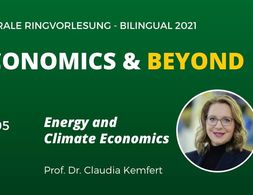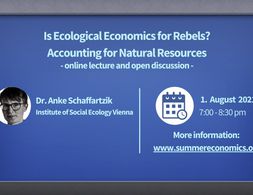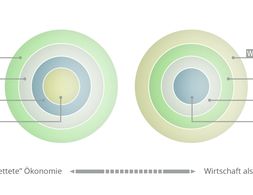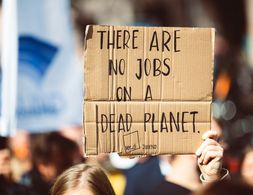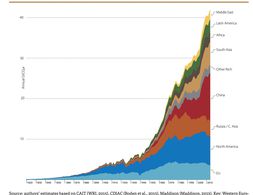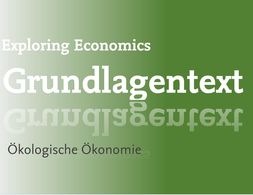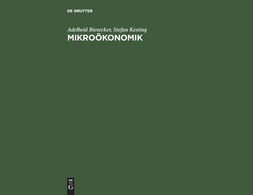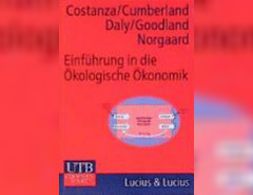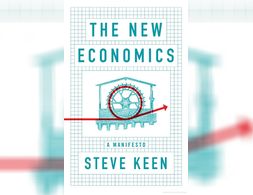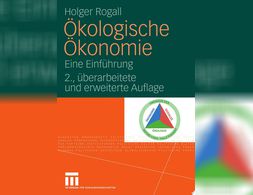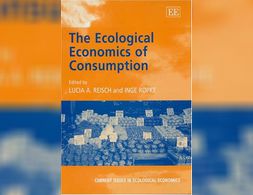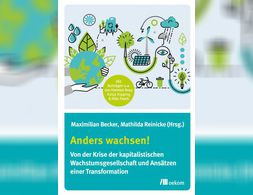30 Ergebnisse
Photo by Markus Spiske on Unsplash Dieses Dossier ist im Rahmen der Schreibwerkstatt Ecological Economics einer Kooperation zwischen der TU Berlin und Exploring Economics entstanden Weitere Informationen und Dossiers zu der Thematik findet Ihr hier Ein Zeitumkehrer in der Klimaökonomik Was die Zeitpräferenzrate mit Generationengerechtigkeit zu tun hat Autorin Sarah …
Dies ist eine Sammlung von Texten und Abbildungen zu verschiedenen ökonomischen Perspektiven. Zu Beginn der Sammlung wird jede ökonomische Perspektive einzeln vorgestellt. Im zweiten Teil werden alle Perspektiven miteinander verglichen, damit Gemeinsamkeiten und Unterschiede erkennbar werden. Die Texte in dieser Sammlung sind bewusst einfach gehalten, da sie eine Einführung in die Thematik darstellen. Die Sammlung ist zudem auf die Darstellung einiger Perspektiven beschränkt und deckt bei Weitem nicht das gesamte Spektrum pluraler Ökonomik ab.
This course will introduce key concepts, theories and methods from socioeconomics. The first part of the course, will deal with the main economic actors and how their interactions are governed. Markets are seen as sets of social institutions. Institutions shape how consumers, firms and other economic actors behave. While it is difficult to understand how novelty emerges, we can study the conditions that are conducive to innovation. We will review how economic performance, social progress and human wellbeing are measured and what progress has been made. In the second part of the course, we will study a specific macroeconomic model that accounts for biophysical boundaries and inequality.
Der Beitrag befasst sich mit der Schaffung finanztheoretischer Rahmenbedingungen hinsichtlich einer sozial-ökologischen Transformation der heutigen Wirtschaftsweise durch gezielt-effiziente Anpassung der Geschäftstätigkeit des globalen Bankensektors unter Betrachtung der resultierenden Folgewirkungen zwecks hinreichender Zielerfüllung im Sinne des Pariser Abkommens.
Wie erfüllen und finanzieren wir die Ziele des Pariser Abkommen / Climate Agreement (Social Development Goals (SDG) & Environmental Social Governance (ESG)) in nur noch 30 Jahren? Eine mögliche Antwort.
Das Seminar "Einführung in die Plurale Ökonomik" bietet einen systematischen Einstieg in die ökonomische Theoriegeschichte und gibt einen Überblick über verschiedene ökonomische Theorieschulen, wie z.B. Verhaltensökonomik, Institutionelle Ökonomie, Postkeynesianismus, Ökologische Ökonomie und kritische Entwicklungsökonomie.
Is our system capable of energy transition and climate protection? How plural is economic policy in practice and who makes the big decisions? What kind of change do we want?
Based on a paper by Jason Hickel and Giorgos Kallis Decoupling refers to the separation of economic value creation material extraction and pollution. Ecological limits pose a challenge to growth-led development and the low historical and predicted rate of decoupling suggests that long-term sustainable growth-led development is impossible.
Ecologcial economics conceptualizes our society as embedded within the environment and our economic system as embedded within society and the environment.
Die dominante Ökonomie fordert eine Bepreisung der Umwelt – spielt aber de facto beim Klimaschutz eine bremsende Rolle. Ihre Vorstellungen von „dem Markt“ sind zur direkten Bedrohung der Menschheit geworden.
In der Auseinandersetzung um eine nachhaltige und lebenswerte Zukunft ist die Arbeitskritik eine unerlässliche Perspektive. Denn Arbeit basiert immer auf Ressourcen- und Energieverbrauch und hat somit immer direkte oder indirekte Umweltauswirkungen.
The British historian, Adam Tooze, highlights how the climate crisis is not just an environmental or ecological problem but also a political economy challenge.
This workshop offers an introduction to Degrowth and Ecological Economics. It starts by surveying the socio-ecological crisis and its pseudo-solutions, and then moves to Ecological Macroeconomics as a relatively recent field of scholarship within Ecological Economics.
After completing the module, participants should be able to analyse the concepts of degrowth, ecological unequal exchange, Green New Deal, and embeddedness by applying theories situated within the fields of academic research of Ecological Economics and Political Ecology.
This archive contains open access copies of most of the written work, including the books of Karl William Kapp (1910-1976) was one of the forefathers of Ecological Economics.
In den letzten Jahrzehnten ist es wiederholt zu Crashs und Stagnation auf den Finanzmärkten gekommen. Wiederkehrende Finanzkrisen sind ein Indiz dafür, dass Finanzmärkte latent instabil sind. Zentralbank und Staat (Regierung) mussten intervenieren, um die Finanzmärkte in einer Krise zu stabilisieren.
Das Paradigma der ökologischen Ökonomie (Ecological Economics) stellt einen multidisziplinärern Ansatz dar, um ein ganzheitliches Bild der wachsenden ökologischen Probleme und ihrer Verflechtungen mit der Ökonomie zu erhalten. Sie beschäftigt sich mit Ressourcenknappheit, Umweltverschmutzung, Klimawandel, Nahrungsmittelknappheit oder sozialer Ungleichheit. Hierbei werden wissenschaftliche Disziplinen wie Ökologie, Ökonomie, Physik und zunehmend auch andere Sozial- und Geisteswissenschaften (z.B. Soziologie oder Philosophie) herangezogen, mit dem Ziel, im ökonomischen Denken auch ökologische, ethische, politische, institutionelle und soziale Faktoren zu berücksichtigen. In diesem Zusammenhang werden nichtzuletzt deshalb auch wesentliche Grundannahmen der orthodoxen Ökonomie sehr kritisch betrachtet (Constanza 1989, Ayres 2008, Spash 2010).
The 2007-2008 financial crisis exposed the shortcomings of mainstream economic theory with economists unprepared to deal with it. In the face of this, a major rethinking of economics seems necessary and in presenting alternative approaches to economic theory, this book contributes to the rebuilding of the discipline.
Das Lehrbuch macht die Vielfalt mikroökonomischer Ansätze sichtbar und führt sie im Konzept der Mikroökonomik aus sozial-ökologischer Perspektive zusammen.
Taking as its starting point the interdependence of the economy and the natural environment, this book provides a comprehensive introduction to the emerging field of ecological economics.
Das Lehrbuch "An Introduction to Ecological Economics" von Robert Costanza, John Cumberland, Herman Daly, Robert Goodland and Richard Norgaard ist ein Meilenstein im Hinblick auf eine verständliche Darstellung der Integration von Ökologie und Ökonomie zur neuen Disziplin der Ökologischen Ökonomik.
Ecological economics explores new ways of thinking about how we manage our lives and our planet to achieve a sustainable, equitable, and prosperous future. Ecological economics extends and integrates the study and management of both "nature's household" and "humankind's household"—An Introduction to Ecological Economics, Second Edition, the first update and expansion of this classic text in 15 years, describes new approaches to achieving a sustainable and desirable human presence on Earth.
In its first edition, this book helped to define the emerging field of ecological economics. This new edition surveys the field today. It incorporates all of the latest research findings and grounds economic inquiry in a more robust understanding of human needs and behavior.
That’s why it is time, says renegade economist Kate Raworth, to revise our economic thinking for the 21st century. In Doughnut Economics, she sets out seven key ways to fundamentally reframe our understanding of what economics is and does.
This book argues that mainstream economics, with its present methodological approach, is limited in its ability to analyze and develop adequate public policy to deal with environmental problems and sustainable development. Each chapter provides major insights into many of todays environmental problems such as global warming and sustainable growth.
Ecological economics addresses one of the fundamental flaws in conventional economics--its failure to consider biophysical and social reality in its analyses and equations. Ecological Economics: Principles and Applications is an introductory-level textbook that offers a pedagogically complete examination of this dynamic new field.
"Ecological economics is an exciting interdisciplinary field of study that combines insights from the natural sciences, economics, philosophy and other fields to develop innovative approaches to environmental problems.
Having dissected what's supposedly wrong with contemporary macroeconomics, Steve Keen, on the leading critics of the mainstream of our times and distinguished economist himself, goes on to present his idea of a New Economics: What premises it should build on, what methods it should use, and yes, what purpose it should serve.
Eine Einführung Dieses Buch bietet eine umfassende systematische und allgemeinverständliche Einführung in die theoretischen und praktischen Grundlagen der ökologischen Ökonomie Es stellt die entscheidenden Theorien und transdisziplinären Schwerpunkte des Faches vor und entwickelt auf dieser Basis den Grundriss für die ökonomische Theorie einer nachhaltigen Entwicklung Darüber hinaus werden die praktischen …
Research on consumption from an environmental perspective has exploded since the late 1990s. This important new volume cuts across disciplines to present the latest research in the field. The book is divided into three parts, the first of which addresses the problems of consumption both as a concept and as an economic and social force with high environmental impact.
Nahezu alle Bereiche unseres Lebens sind vom Wachstums- und Beschleunigungsdenken geprägt. Die Grundannahme des ewig andauernden Wirtschaftswachstums ist dabei an das Versprechen von Wohlstand und Reichtum geknüpft.
Wir nutzen Cookies. Klicke auf "Akzeptieren" um uns dabei zu helfen, Exploring Economics immer besser zu machen!

